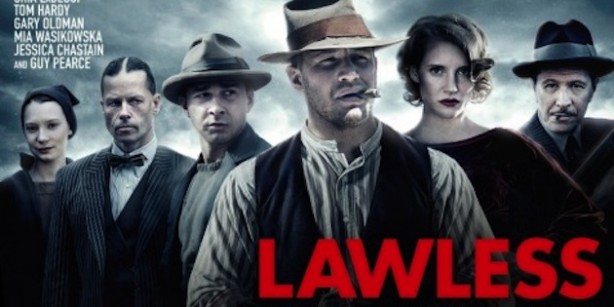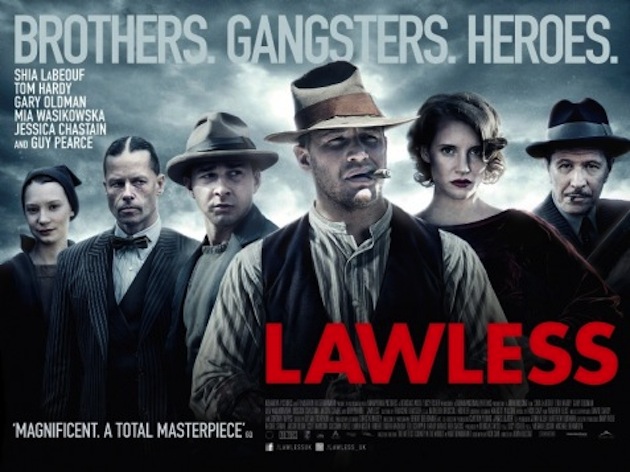 Film + TV
Film + TV
The cinema of Nick Cave
by John Semley
September 24, 2012
Film School looks at the points of contact between movies of bands, film culture, and music culture.

I will admit to really liking Nick Cave. To me, he’s not just an aging punk bard, or a poster-sized image of his younger self—lively rooster pompadour perfectly tousled, wriggled into a skin-tight “A GOOD COP IS A DEAD COP!” t-shirt—but a legitimate, viable artist, with a proper oeuvre and the whole thing. Has any other post-punk progenitor been able to forge such a varied, compelling career? Where is John Lydon’s Tender Prey? Where is Tom Verlaine’s Abattoir Blues? Of musicians of his generation, Cave is beyond compare.
A chronicler of love, and so of heartache, and so of the abiding sadness of everyday life, Cave’s career arc positions him as Leonard Cohen’s heir apparent as Poet Laureate of Loneliness. And like Cohen—a novelist, a poet, doodler, and sometimes-actor—Cave is something of Renaissance man. He’s published two novels, penned an intro to the Gospel Of Mark for a series of pocket-sized books of the Bible, composed soundtracks (many with fellow Bad Seed Warren Ellis), and worked as an actor, most notably as himself in Wim Wenders’ Wings of Desire and as an itinerant rock star in the early Brad Pitt vehicle Johnny Suede.
He’s also written screenplays, forming a semi-lucrative creative partnership with Australian filmmaker John Hillcoat. Cave is one of six writers credited with the screenplay for Hillcoat’s unforgettable debut, the 1988 prison thriller Ghosts…Of the Civil Dead. More prominently, Cave scripted (and scored) Hillcoat’s 2005 western The Proposition, which transposed the violent, end-of-an-era attitude that marked American westerns from The Wild Bunch to Unforgiven onto the unruly Australian outback in the 1880s. Cave and Ellis also provided Hillcoat’s 2009 adaptation of The Road with a twinkly, saccharine score that fit the mood of Hillcoat’s mostly middling adaption of Cormac McCarthy’s affecting apocalyptic novel.
That Cave’s score is in large part responsible for spoiling The Road reveals how totally intermingled Cave and Hillcoat’s sensibilities are, to the point that Nick Cave seems, at times, to be the real author of Hillcoat’s films. It helps that Cave, across albums, novels, and other scattered output, has fashioned something of a discernible signature that appears again and again in his screenplays. It’s there in the climax of The Proposition, in which Emily Watson is brutally raped during Christmas dinner, a scene of distinctly Cave-ian maudlin high opera. It’s there, too, in The Road, which might as well have been called “Papa Won’t Leave You, Henry.”
Cave and Hillcoat’s latest collaboration, the prohibition caper Lawless, recently opened in North American cinemas. Adapted from Matt Bondurant’s novel The Wettest County in the World, Lawless casts ubiquitous star presences Tom Hardy and Shia LaBeouf as brothers running a lucrative bootlegging operation in Floyd County, Virginia. Like much of Cave’s output, from his Faulkneresque first novel And The Ass Saw The Angel, to the Beat-influenced garage rock ramblings of the Bad Seeds’ last record, 2008’s Dig, Lazarus, Dig!!!, Lawless is wrapped up with Cave’s hyper-literary construction of America. Like The Proposition, its Biblical brotherly tensions and clouding of the borders between the civilizing lawmen and the desperadoes endears Lawless to the expanding canon of Nick Cave cinema.
“I have a problem with death freaks,” Robert Christgau wrote of Nick Cave, songwriter. “And since I also have a problem with Americans who obsess on America’s ‘dark side,’ I have more of a problem with non-Americans who follow suit.” Cave can for sure be accused being preoccupied with this “dark side” of America. (He can also be accused of being “non-American.” Because he’s Australian.)
I disagree with Christgau. Not just about Nick Cave (or Black Sabbath), but about this idea of non-Americans obsessing over America. As French filmmaker and critic Eric Rohmer once wrote, “America is protean.” It is elusive, and changeable. It is a big amorphous amoeba of a nation that can be hard to make sense of.
This is especially true for outsiders, like French people or Australian people (or Canadian people), who tend to view “America” as a big idea—maybe the biggest idea—a hulking mass of tropes and clichés. This is the literary level at which someone like Cave engages with the mythology of America. He’s similar to Tom Waits, or Bruce Springsteen, who enshrine the legacy America’s dive bar squats and fabled labyrinths of pitch-black highways, albeit from within.
But to me, Waits’ cartoon hobo clowning and Springsteen’s blue collar stadium rock posturing ring insincere, precisely because they’re American. They’re betraying the lived reality of America for its more epic doppelganger. As a tourist, Cave approaches “America” as if it were a nebulous shadowy-self, rich in history, mythology, and most of all violence. Cave’s America is Rhomer’s America.
The Proposition was so interesting a film because it imbued Cave’s native Australia with this protean dimension, taking for granted that the outback’s history of colonization and sadistic incivility was as worthy for investigation as America’s. If Lawless sputters, it’s because its Prohibition-era American setting is already folklorically over-determined. In places it even seems like the screenplay is an outtake for Cave’s musical journey through mythical American badassery, 1996’s Murder Ballads. It’s been done.
Still, it’s to Cave’s credit that even Lawless feels splattered with his signature, further expanding the breadth of his cinema. Quality’s not necessarily a marker of authorial control, after all. Even Leonard Cohen had Book Of Longing.
Tags: Film + TV, News, Film School, Nick Cave





